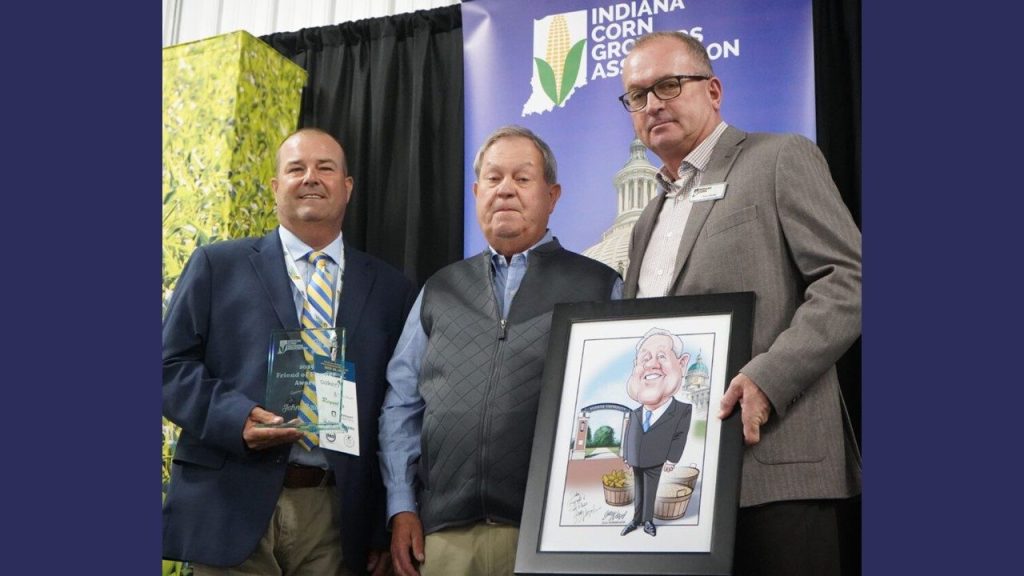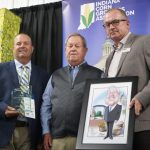
John Baugh, Purdue University’s Director of Agricultural Services and Regulations, has recently been presented with the 2025 Friend of Farmer award from Indiana Soybean Alliance’s Membership and Policy Committee (M&P) and Indiana Corn Growers Association (ICGA).
The award is presented to a policy leader who leads and advocates on issues that benefit Indiana farmers. As an ex-officio board member for M&P and ICGA, and a career with Purdue and Indiana Farm Bureau, Baugh easily qualified for the honor.
“Baugh has been a steady presence at the Indiana Statehouse for more than three decades,” said Brian Warpup, Chair of the Indiana Soybean Alliance’s Membership and Policy Committee (M&P). “He has helped shape critical legislation affecting farmers and rural communities.”
Baugh has lobbied for farmers at the Indiana Statehouse since 1987. Some of the efforts he has campaigned for include:
- Establishing the Indiana Grain Indemnity Fund
- Creating the Indiana corn checkoff law
- Expanding rural broadband access
- Modernizing chemical applicator licensing
- Supporting Sustainable agronomic practices
“The old saying goes, ‘If you like good laws and good sausage, you should never see either one made,’” Baugh quipped. “You know, I like sausage, and I like good policy. I’ve seen them both made, and I still like good sausage and good laws.”
He worked on regional projects such as brokering a partnership between Vincennes University and Purdue’s Southwest Agricultural Center in Knox County. He also led funding efforts for the Animal Disease Diagnostic Laboratory in West Lafayette, Ind., and the Heeke Diagnostic Lab in Dubois County. These efforts have led to a few awards in recent years.
“John Baugh has been a respected advocate in academia and public policy,” said Indiana Corn Growers Association (ICGA) President Chris Cherry. “He was honored with the Hovde Award for Excellence in Educational Service in 2022, and he was awarded the 2024 AgriVision Award from the Indiana State Department of Agriculture. We’re happy to have him add this award to his trophy case.”
Baugh is the eighth winner of the award. Past winners include:
- U.S. Sen. Joe Donnelly (D-Ind.).
- U.S. Rep. Jackie Walorski (R-Dist. 2)
- U.S. Rep. Jim Baird (R-Dist. 4)
- Ted McKinney, CEO of the National Association of State Departments of Agriculture (NASDA)
- State Rep. Don Lehe (R-Brookston, Ind.)
- State Sen. Jean Leising (R-Oldenberg, Ind.)
- State Rep. Ed Soliday (R-Valparaiso, Ind.)
A love for farming
Baugh said his path to Purdue started in an unusual location.
“I am actually one of the few Purdue grads who lived in Monroe County (home of Purdue rival Indiana University,” he said smiling.
Baugh was born and raised on a small farm in Monroe County, Ind. His father kept beef and dairy cows and a “mixed bag” of other farm products, but he primarily was employed by Allison Transmission.
“But I loved farming,” Baugh said. “I got active in 4-H, and I did the 10 years. I showed hogs and sheep. I had a beef steer one year. I was really into livestock.”
After attending Purdue for two years, Baugh was drafted into the U.S. Army. He spent the next 19 month on active duty – 14 of those in Vietnam.
“I always figured I would go out West to work,” Baugh said. “I love cattle, and I love the beef industry, so that was kind of the goal. After the Army, though, I thought Indiana was a darn good place to live.”
Following his military service, he returned to Purdue with better focus, more mature, and graduated in 1972 with a degree in animal science. Later that year, he married his wife, Barbara. The couple ended up having three children: a daughter, Gretchen; a son, Chrisly, and another son, Clint. Today, the couple now enjoys visits from four grandchildren and two great-grandchildren.
Later in 1972, Baugh was hired to do livestock carcass evaluations by Marion Stackhouse, who led Indiana Farm Bureau’s commodity department. He would travel the state and evaluate carcasses in processing plants and collecting data.
Occasionally, he would give educational programs to clubs and school classes about carcass evaluation. This was his career until the late 1980s.
After being assured that he would continue to work with farmers, Baugh moved to the legislative department at Indiana Farm Bureau in 1987. Mostly he worked on policies regarding transportation and anything pertaining to the General Assembly’s ag committees.
By 1995, an opportunity opened at Purdue University for a policy position within the ag department, and he was hired by then-Dean of Agriculture Vic Lechtenberg.
“It was a job opening at Purdue that I could do without having a Ph.D. or anything like that,” Baugh said. “I struggled a little bit about the decision to leave Farm Bureau and go to Purdue. I’d lay awake at night think, ‘I’m going to have to this; I’ve got to do that.’ But my heart was at Purdue, and it was a good move. I’ve been doing it for 30 years, so it must’ve been a good move.”
Philosophy of policy
Baugh said he learned many years ago that building coalitions between many groups and many people is the best way to create beneficial new policies. He’s applied that belief to many campaigns such as creating the Indiana Grain Indemnity Fund, fighting for farm-friendly weight limits for transportation of ag commodities, establishing the Indiana corn checkoff law and much more.
“First of all, let me say this, I’ve never done anything by myself,” Baugh explained. “I’ve always been part of a team. When I played basketball in grade school, I was on a team. When I got to Vietnam, I was on an advisory team. At Farm Bureau, I was on membership, legislative teams and more. So, People don’t get much done all by themselves. You’ve got to bring something to the conversation, but you’ve got to have people with you to get anything accomplished.”
He said good organizations are fiscally responsible, responsive to their membership and communicates its programs and progress frequently.
“It’s a difficult situation to manage, really,” Baugh said. “Ideally, you shouldn’t need to spend money telling me what you’re doing, you just need to spend it on the things I want you to do. But if your membership doesn’t know what you’re doing – if you’re not communicating with them – then your members don’t understand that you’re accomplishing their goals.”
He added that ISA’s Membership and Policy Committee will consider working with lawmakers to introduce a bill that will provide a safety net for the state soybean checkoff program. At present, the Indiana Soybean Alliance only exists by an act of federal law. If the federal checkoff law should ever be overturned, then ISA’s efforts to expand soybean markets, research growing techniques, develop new soy-based products and more would cease.
ISA hopes to work with a lawmaker to create a state soybean checkoff law that would only kick into action if the federal law is overturned. All other top soybean-growing states already have this law in place. Baugh said it is a good plan, and he will work to help it advance.
“This also will give us a chance to talk to farmers about all of the good things the checkoff is doing for Indiana farmers,” he said. “It will be a good opportunity to build relationships with farmers and lawmakers and to show folks what good can be done when people are working together.”
Written by: Dave Blower, Jr., Indiana Corn Growers Association (ICGA) and Indiana Soybean Alliance’s Membership & Policy (M&P) Committee.









